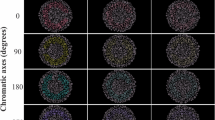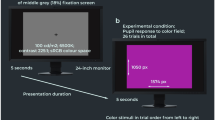Abstract
TWO achromats, a woman student and a man student, were recently tested for colour vision. Both proved to be of the so-called pure rod-vision type1, completely lacking in hue discrimination, with marked photophobia, nystagmus and central scotoma in photopic vision, and both had been totally colour blind since infancy.
This is a preview of subscription content, access via your institution
Access options
Subscribe to this journal
Receive 51 print issues and online access
$199.00 per year
only $3.90 per issue
Buy this article
- Purchase on Springer Link
- Instant access to full article PDF
Prices may be subject to local taxes which are calculated during checkout
Similar content being viewed by others
References
Sloan, Louise L., J. Opt. Soc. Amer., 44, 117 (1954); Geldard, F. A., J. Opt. Soc. Amer., 23, 256 (1933).
Schmidt, I., Amer. J. Optometry, 32, 404 (1955); Pickford, R. W., “Individual Differences in Colour Vision”, 335 (London, 1951).
Pickford, R. W., Brit. J. Physiol. Optics, 14, 2 (1957).
Author information
Authors and Affiliations
Rights and permissions
About this article
Cite this article
PICKFORD, R. Colour Vision of Achromats' Parents. Nature 180, 926–927 (1957). https://doi.org/10.1038/180926b0
Issue Date:
DOI: https://doi.org/10.1038/180926b0
This article is cited by
-
Electroretinographic findings (including flicker) in carriers of congenital X-linked achromatopsia
Documenta Ophthalmologica (1964)
Comments
By submitting a comment you agree to abide by our Terms and Community Guidelines. If you find something abusive or that does not comply with our terms or guidelines please flag it as inappropriate.



